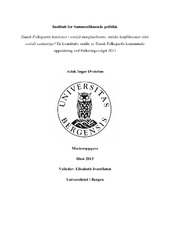Dansk Folkepartis bastioner - sosialt marginaliserte, etniske konfliktsoner eller sosialt samhørige? En kvantitativ studie av Dansk Folkepartis kommunale oppslutning ved Folketingsvalget 2011
Master thesis
Permanent lenke
https://hdl.handle.net/1956/7642Utgivelsesdato
2013-11-19Metadata
Vis full innførselSamlinger
Sammendrag
The electoral success of right-wing populist parties in recent years has been widely studied by scholars of political science. However, their electoral success also varies significantly within countries. The aim of this thesis is to analyze the extent to which the political, economic and social context can explain the subnational variation in the vote for the populist right. The research question of this master thesis is: To what extent can existing theories on subnational variation in the support for right-wing populist parties explain variation in the support for the Danish People's Party (DPP)? The leading theories for explaining such subnational variation are the social marginalisation theory, ethnic competition theory and theories focusing on social cohesion and social dislocation as the central dimensions. In this thesis, I analyze all three theories to determine the extent to which they can explain the subnational variation in the support for the DPP. This thesis uses aggregate data on Danish municipalities from Statistics Denmark, the national statistics bureau. Consequently, the dependent variable is the support for the DPP at the municipal level in the most recent Danish general election, held in 2011. I then analyze these sets of data using bivariate correlation analyses and two separate multivariate regression models. The results of these analyses indicate that the social and political context favorable for the DPP are areas with a high crime rate and low average education levels. In addition, the party performs better in smaller municipalities and in municipalities with higher levels of commuting. Consequently, this thesis mainly finds support for the social marginalisation thesis. The results from the multivariate regression models do not give support to the ethnic competition theory or the theory of social cohesion. Contrary to the theoretical expectations, this thesis does not find support for the hypothesized positive relationship between the vote for the populist right and subnational concentrations of immigrants. As for the theory of social cohesion, I question earlier studies' uses of the amount of property owners' as a central contextual variable to understand the subnational variation in the support for the populist right. This thesis argues that the observed differences between earlier studies and the findings of this thesis are partly caused by the idiosyncratic properties of the Danish party system.
